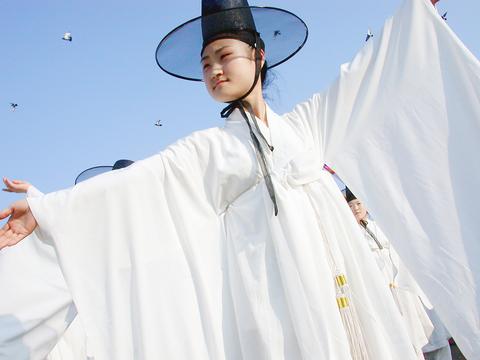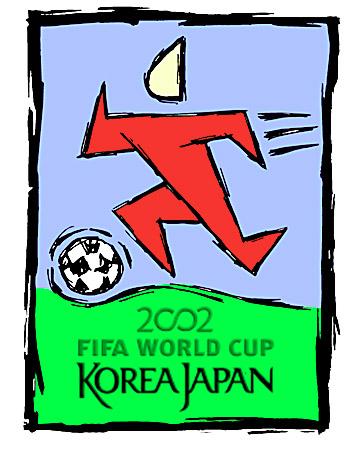Soccer is building bridges between South Korea and Japan, but they're not very strong.
Proof of this was the recreation in Busan, South Korea, yesterday of a diplomatic mission over 500 years ago between the two countries.

PHOTO: JULES QUARTLY, TAIPEI TIMES
For the organizers it was another example of how the World Cup hosts have co-existed in harmony for hundreds of years, but for many in the crowd watching it stirred bitter memories of the Japanese annexation of their country just under 100 years ago.

As part of a comprehensive program of cultural events surrounding the World Cup, locals slipped on 15th century costumes, consisting of elaborate hats and flowing robes.
To the wailing of traditional pipes, string instruments and drums they re-enacted the departure of the 400-person delegation from the southwestern port of Busan to Japan.
The "envoys" received their credentials from the "Chosun Dynasty governor" in order to lead a mission intended to patch up problems with Edo-era Japan.
Then there was a colorful and noisy parade through the streets down to the harbor involving 1,000 dancers, singers, bands and folk artists.
While World Cup fans marveled and recorded the event for posterity, Assistant Director of the Busan Culture and Art Department Rho Yoon-suck beamed.
"The World Cup is like an anniversary of the delegation 500 years ago which started the transfer of exchanges between us and Japan," he said.
He pointed out that the original mission had been a success and created good diplomatic relations between the two countries for 200 years. He said the World Cup could help achieve the same end.
Many South Koreans, however, were more pessimistic.
They said it would take more than a soccer tournament and a procession down to the harbor to mend ties.
Japan occupied the Korean peninsula from 1910 to 1945 and many South Koreans still feel the Japanese have never adequately apologized for their often-brutal rule.
Busan National University German-language student Kang Bo-kyung said the show of brotherliness for the World Cup between the co-hosts papered over fundamental problems that existed between the two countries.
"I think there are better ways to improve the relationship than hosting the World Cup together. Japan thinks it will help, but we don't.
"The younger generation [of Japanese] might have better feelings toward their disturbing past, but only when they take a stance and apologize will it make any difference."
Kang said the recent admission by the Japanese emperor that his family had Korean roots did not go far enough toward reconciliation.
"We don't feel better about this. It doesn't change the history. They have twisted the reality of what happened, the history between our two nations.
"They must change the texts of their history books and most importantly they must say more than `sorry.' They must officially apologize for what they've done."
Kang added that Japan Prime Minister Junichiro Koizumi's decision to visit the shrines of Japan's war dead just before the start of the World Cup had set relations back a step.
"We can be good friends with Japan's younger generation but the problems of the past still remain, obviously."
A souvenir shop assistant in Busan, 28-year-old Choi Hye-kyung, was more upbeat about the future of Japan-South Korea relations.
"Once upon a time we had very uncomfortable feelings about the Japanese, but this is the 21st century, so we must have a new relationship," she said.
"I meet quite a lot of Japanese in our shop and it seems to me the younger ones have a better understanding of what went on in our history. This World Cup will help us make a new relationship through the game of soccer."
Though unlikely, a meeting between Japan and South Korea in a World Cup eliminator would be intriguing for the nationalistic feelings it would inevitably raise.

Freddie Freeman homered and drove in four runs, Shohei Ohtani also went deep and Roki Sasaki earned his first major league win as the Los Angeles Dodgers beat the Atlanta Braves 10-3 on Saturday night for their seventh straight victory. The Dodgers have won the first two games of the series to improve to 5-0 against Atlanta this year. Los Angeles’ three-game sweep at home early in the season left the Braves 0-7. Sasaki allowed three runs and six hits over five innings. The 23-year-old right-hander gave up a home run to Ozzie Albies, but received plenty of offensive support in his

Bayern Munich on Sunday were crowned German champions for the 34th time, giving striker Harry Kane his first major trophy, after second-placed Bayer 04 Leverkusen drew 2-2 at SC Freiburg. Bayern’s 3-3 draw at RB Leipzig on Saturday, when the Bavarians came from two goals down to take the lead before conceding a stoppage-time equalizer, meant defending Bundesliga champions Leverkusen needed to win at Freiburg to delay the title party. Leverkusen were two goals down before scoring twice in the final 10 minutes, but Xabi Alonso’s side could not find a third, as Bayern reclaimed the title at the first attempt after

INTER AWAIT: Superb saves by PSG ’keeper Gianluigi Donnarumma inspired the victory, as Arsenal were punished for misses, including one by Bukayo Saka Arsenal on Wednesday fell short on the big stage again as their painful UEFA Champions League semi-final exit against Paris Saint-Germain left Mikel Arteta to rue his club’s failure to provide him with enough attacking options. Arteta’s side were unable to reach the Champions League final for the first time in 19 years as PSG clinched a tense 2-1 win at Parc des Princes. Trailing 1-0 from last week’s first leg in London, the Gunners made a blistering start to the second leg, but could not convert their chances as Gianluigi Donnarumma’s superb saves inspired PSG’s 3-1 aggregate victory. Arsenal were punished for

THRILLER: Raphinha gave Barca a 3-2 lead with two minutes remaining of regular time, but Francesco Acerbi equalized the game in the second minute of added time Davide Frattesi on Tuesday fired Inter into the UEFA Champions League final with an extra-time winner that gave the Italians a stunning 4-3 triumph over Barcelona, 7-6 on aggregate. Italy midfielder Frattesi won a tie for the ages under a downpour in Milan when he lashed home in the 99th minute, sending a packed and rocking San Siro wild with joy. Simone Inzaghi’s team will face either Arsenal or Paris Saint-Germain at the end of this month in Munich, Germany, where they would feel they have a great chance to be crowned kings of Europe for a fourth time after